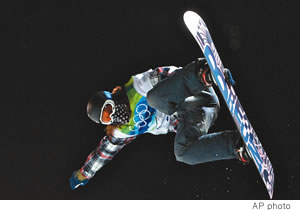Why The Winter Games Are Better

Wednesday - February 24, 2010
| Share
 Del.icio.us
Del.icio.us
|
The Winter Olympics may never reach the lofty television numbers enjoyed by its warm-weather cousin. And that’s a shame. Admittedly, many of the contests are just too foreign for American viewers. But what also is undeniable is that the IOC’s cold-weather product has eclipsed the Summer Games in sheer excitement and drama. It has also done a better job attracting newer and, frankly, better sports.
The Winter Olympics, for at least the foreseeable future, will have the millstone of curling around its neck much like the summer games must contend with badminton, table tennis, sailing, equestrian and any number of paddling sports where the only difference is the size of the boat. This is not likely to change as too many nations favor these inexpensive sports that allow them to load up on the medal count with a minimum investment.
Let us now pause to allow for the ire of those whose nations dominate said sports or who want to argue the historical significance of each event.
Thank you.
The biggest challenge facing the Olympics, both summer and winter, is the stagnation of events.
One can wax poetic about honoring the history of athletics through the showmanship of highly trained horses, or the ability to ski and then shoot for that matter, but blind loyalty to events that are no longer relevant kills
interest and does absolutely nothing for ratings. No viewers means no Olympics, and the IOC must be weary of looking beyond new sports because of fear of upsetting traditionalists. The livelihood of the games depends on it.
The inclusion of the so-called extreme sports, though questioned at first by both sides, was a stroke of marketing genius. Viewers, tired of the same old events and turned on by the faster and more creative X-Games, now have a reason to watch. More importantly, the IOC has been able to lure younger audiences. In addition to downhill skiing and short-track speed skating, viewers got moguls, aerials, ski and snowboard cross, and the most creative and dangerous snowboard half pipe. The new additions even have their own matinee idol - something the Summer Games occasionally has and the Winter Olympics has never had.
Shaun White is more than just the world’s best in the half pipe. At just 23,
he is the most dominant athlete in sports. Whether it’s at the Winter X-Games, the Olympics or his Big in Japan video where he and friends snowboard off trees and ledges into powder so deep they disappear, White is simply better than everyone around him. And it isn’t even close. NBC’s superimposed image of White soaring five feet above Russia’s Iouri Podladtchikov just gave further evidence of his dominance. Funny thing, though, it wasn’t needed. White’s talent is so obvious one doesn’t need network technology to convince the brain what the eyes already know - that this guy is special and is someone the Olympics can, and should, build its campaign around.
What makes White such a perfect spokesman is that he succeeds in both sides of the business without threatening either. He is shrewd enough to exploit the marketing opportunities that have made him the wealthiest athlete in Vancouver while maintaining his credibility in a sport that still sees itself mostly as an anti-establishment refuge from corporate America.
One of the reasons White and the new events are such easy fits in the Winter Olympics is that they are natural growths of alpine events that have been around for ages. Though rarely marketed in such a way, alpine skiing has always been about speed and daring. This fact was well-evident in the women’s downhill, where six women crashed at speeds that would get you ticketed on the largest freeways. One competitor had to be airlifted off the course in a helicopter.
It remains to be seen if the general public will embrace winter sports as they have the Summer Games. The Winter Olympics will always be hampered by the fact its sports depend too heavily on sometimes-dubious scoring criteria and not on simply who crosses the finish line first. But progress is being made.
The Winter Olympics’ newest additions are light years ahead of summer’s newest entries, and it may be just a matter of time before viewers catch up with the changes. The Summer Olympics will be hard pressed to maintain its dominance if the best it can offer in the way of new blood is the importation of badminton (1992), beach volleyball (1996), mountain biking (1996), trampoline (2000) and BMX and triathlon (2008).
E-mail this story | Print this page | Comments (0) | Archive | RSS Comments (0) |
Most Recent Comment(s):













